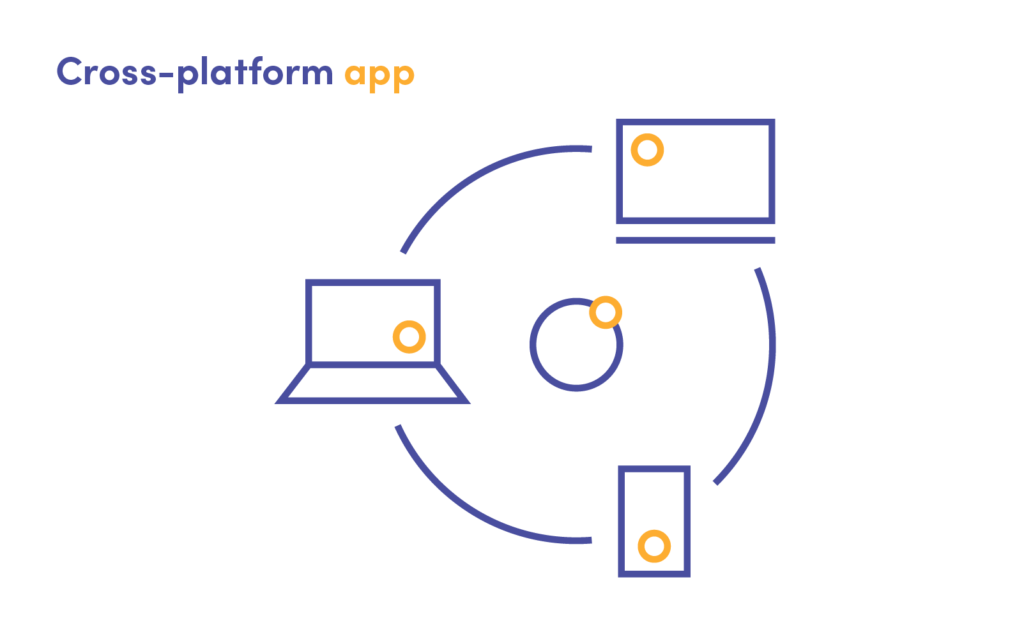If you’re here, you’ve probably heard about cross-platform app development before, and you’re wondering whether it’s the right choice for your business. We’re here to help you out. In this article, we’re going to quickly explain the difference between cross-platform mobile app development and its alternatives. Then, we’ll move on to the main part: what are the advantages of cross-platform app development.
Ready to find out how cross-platform app development can benefit your product? Keep on reading to learn more:
What is cross-platform app development
The term cross-platform development is easier to understand when compared with native development.
Native apps are created for a specific platform, usually either Android or iOS. Cross-platform apps, on the other hand, use an intermediate language that works on multiple platforms. Typically, a cross-platform application will work both on iOS and Android, as these two systems cover the vast majority of the market.
You might also have heard about another approach, called hybrid app development. Here’s how it compares to cross-platform applications:
What is the difference between hybrid app development and cross-platform app development
To put it simply, hybrid apps combine the features of native and web applications. In contrast, cross-platform apps use the same codebase for all platforms, while the differences are visible mainly in the UI.
So, what makes cross-platform a good choice compared to the alternatives? Let’s have a closer look:

Who needs cross-platform app development
With so many options available, there’s a range of reasons that call for a cross-platform app. These include:
- Limited software development budget
- Limited time frame – you’d like to release the app as soon as possible
- Building an app for more than one platform
- Focus on a highly customized layout that matches your brand
- Flexible scope – you’d like to test different solutions and introduce new features along the way
- Need for a dynamic user interface
- Considering a desktop or web application for the future
If any of these sounds familiar to you, it might mean that a cross-platform application is the best choice available. Not convinced? Here are some of the most prominent benefits that come with cross-platform app development:
What are the advantages of cross-platform application development
Broader audience
When you’re taking your first steps in the world of mobile devices, it’s not always clear whether you should focus on iOS or Android. Even in-depth market research doesn’t get rid of the risk completely – when you choose just one platform, you might end up losing some great opportunities.
If you choose a cross-platform app instead, you’ll be able to reach a much wider audience. You can easily address both Android and iOS at the same time, and see which one is a more profitable market for your business.
Budget-friendly
Did you know that it takes between 20% and 50% more time to create a cross-platform feature, compared to creating the same feature for a native app?
Although this may sound more time-consuming at first, it’s actually a huge advantage for your budget in the long run. You need to invest more work hours at the start, yet a large part of the code can be reused between platforms. Subsequently, having a shared codebase for all operating systems means lower costs.
What’s more, when you’re developing cross-platform apps, just one team can take care of the whole project! You don’t need separate teams focused or Android or iOS only, which again, decreases the development costs.
Time-to-market advantage
This is another advantage that comes from having just one team working on the project. The process is easier to manage and synchronize, which makes the process much smoother and decreases time-to-market.
It’s also worth mentioning that the most popular cross-platform frameworks, React Native and Flutter, both come with the hot reload feature. Thanks to this solution, the developers can test their code and fix discovered bugs on the go. It makes it easier to experiment and test new ideas.
Thanks to all these assets, cross-platform mobile development teams can create a prototype within just two weeks and release the minimum viable products in ten weeks only. Impressive, isn’t it?
Simplified maintenance
Native apps often mean costly and time-consuming maintenance. In this case, you need to look for bugs in both versions of the application and consider them individually. What’s more, it also requires the involvement of at least two different teams.
The cross-platform approach will save you a lot of hassle in that matter. Flutter and React Native apps are easier to maintain, as you only need to take care of a single codebase.
Stable UI performance
Last but not least, cross-platform apps can pride themselves on stable interfaces. Their UI performance is comparable to native apps, as React Native cross-platform applications render the interfaces with the help of native solutions. And again, as the same code is reused for different platforms, a unified look can be easily maintained on both iOS and Android.
How to get the most out of cross-platform app development
At Miquido, we’re experts in cross-platform app development. Our developers are experienced in both React Native and Flutter, the most popular frameworks used in this approach. Our cross-platform applications are used by world-class companies, such as Cisco and Salesforce.
What’s more, we’ve also collaborated with Google developers. Together we’ve created one of the first Flutter applications ever made!
We’re happy to support your project with our expertise and share our knowledge on the advantages of cross-platform app development. Feel free to reach out and see how we can help with your cross-platform application!





